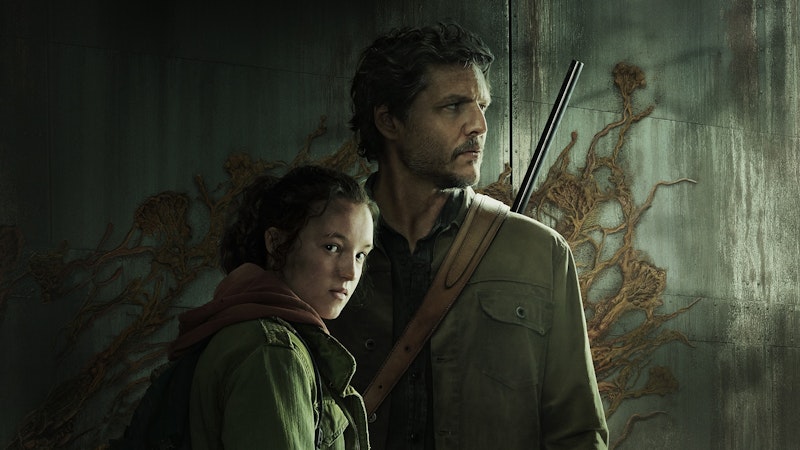Video game adaptations haven’t had the best track record over the years. Arcane and Mortal Kombat are available, but they’re the exception rather than the rule. When I think of games that made the transition to the big screen, there’s Street Fighter, Resident Evil, and the awful Super Mario Brothers.
When HBO announced the development of The Last of Us, I had mixed feelings. Would they capture the emotional intensity of one of the most highly-respected video games of all time? Could they finally legitimize video games as a powerful storytelling art form? Or in a desperate attempt to cash in on a popular franchise, would it be a disaster?
I can give a fairly accurate assessment. The series begins with two experts talking about a hypothetical situation involving a parasitic fungus, discussing a worst-case scenario on a talk show in the 1960s. We learn that these particular genus of fungi—known as cordyceps—infects and controls the minds of ants. But what if rising temperatures meant it could evolve and switch hosts, from ants to humans? This is the terrifying premise that forms The Last of Us.
The Last of Us is a post-apocalyptic drama set 20 years after a mutagenic mind-controlling fungus spreads throughout the world. Within a matter of days, it infected most of the world’s population. It ushered in a global pandemic. Those who weren’t killed in the initial outbreak face a daily struggle to avoid infection. If you’re bitten or happen to breathe in the spores, you’re done, turning into one of a number of different zombie-like creatures, each evolution more dangerous than the last.
Those who manage to survive are rounded up and held in quarantine zones (QZ) run by what’s left of the numerous U.S government agencies. Life in the QZ is a Hobbesian world of everyone against everyone; nasty often brief—dissent is met with public execution. Resources are scarce, so basic necessities are the only form of currency. A resistance group known as the Fireflies engages in armed raids against the regime to overthrow the government and restore freedom.
It’s here that we meet Joel. Played by Pedro Pascal, Joel’s a Texan construction worker in his mid-50s and an isolated individual trapped in the Boston QZ. He lost his daughter on the first day of the outbreak and is now a shell of his former self. To get by, he does maintenance jobs and has a side hustle trading pills with armed soldiers. He’s tasked with helping the fireflies locate a car battery. It’s here that he meets Ellie (Bella Ramsey), a precocious 14-year-old whom he must transport west across the U.S. Ellie’s in possession of something that might save the world.
Visually, The Last of Us is beautiful. The cinematography captures the ruined cities now slowly being reclaimed by nature. The sweeping panoramic shots of highways littered with abandoned and burned-out vehicles help convey the crushing isolation our protagonists must feel on the road. The show does an excellent job of recreating the now-iconic opening scene of the day the world fell apart. Director Craig Mazin captures the emotion felt by a terrified population faced with an unknown killer. Mazin was the creative genius behind the award-winning HBO miniseries Chernobyl.
The series focuses on the relationship between Joel and Ellie as they embark on their epic cross-country adventure. We watch the numerous dangers and challenges Joel must face as he attempts to deliver Ellie to her destination. Along the way, the pair develop a powerful father-daughter bond that gets tested to breaking point. Watching the pair’s relationship develop is moving and a testament to the humanity we find when faced with hardship and uncertainty.
Yet one of the most powerful episodes barely features the two leads. In the third episode, we follow the story of a lonely survivalist called Bill (played by Nick Offerman), who develops a romantic relationship with an artist called Frank (The White Lotus’ Murray Bartlett). Some have criticized the show for depicting a gay relationship when one didn’t exist in the game. Within the context of the show it works. I’d argue Offerman delivers a career-best and defining role as Bill.
Where The Last of Us deviates from similar post-apocalyptic shows is in the origin of the outbreak or virus, or how the contagion spread. For example, in AMC’s The Walking Dead, we get little more than a hushed word in Rick Grimes’ ear about the true origin of the “walkers.” Here, Joel goes into detail as he tells Ellie about how the fungus supposedly got into the nation’s flour supply. Fans of the game know this as the “bread theory.”
The acting is generally superb. Pascal puts in a solid performance as Joel, despite the fact that his Texan accent has faded by episode three. I wasn’t so keen on Ramsey. She has little emotional depth and comes across as laconic. It has flaws, but The Last of Us is the most convincing transition from console to screen I’ve seen.

